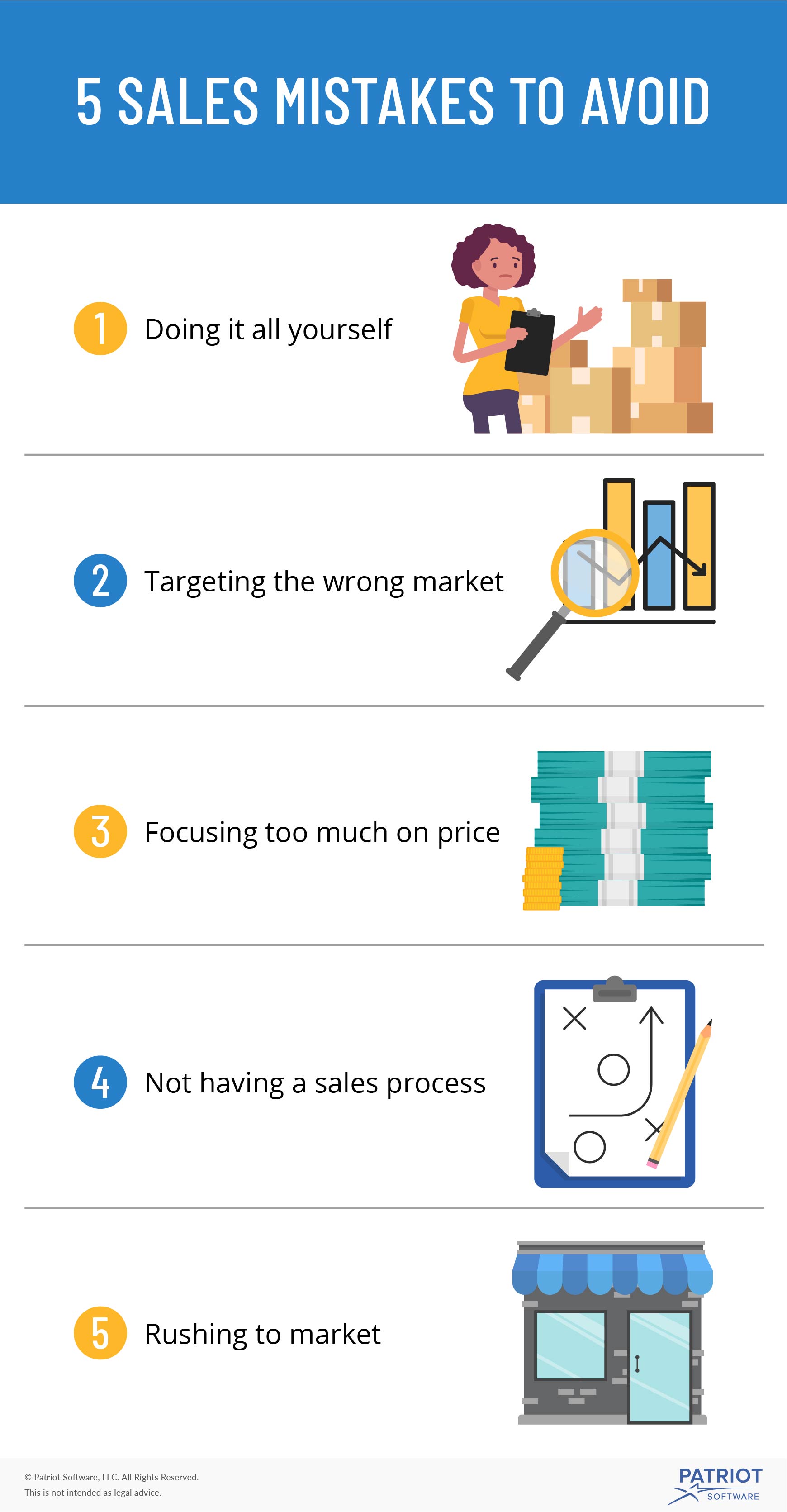No business is perfect. All business owners alike experience failure and make mistakes at some point. But, these missteps can sink your startup before it even gets a chance to take off. To prevent your venture from hurting, you must identify and avoid sales mistakes.
5 Sales mistakes to avoid
Although sales mistakes can vary from business to business, there are some common mistakes each startup may experience. Review the top five sales mistakes and how to avoid them below.

1. Doing it all yourself
When it comes to growing your small business, some business owners get into the mindset that they have to do it all themselves. Their business is their baby, after all. But when it comes to your startup, you can’t be afraid to delegate some responsibilities to other people.
Sales is a huge responsibility that helps drive your business to success. And, you most likely won’t be able to tackle it on your own.
Consider hiring a salesperson or someone who can take some other tasks off your hands (e.g., marketing assistant). Hiring an additional worker can help take some weight off your shoulders and allow you to focus on sales.
Alternatively, if you don’t want to hire an employee, automate some of your processes. You can automate your sales, marketing, and customer relationship management responsibilities by using software or online tools. These tools can help you stay organized and focus on building relationships with prospective customers.
2. Targeting the wrong market
Without your customers, your business can’t prosper. If you want to see your business succeed, you have to know who to target.
Before you begin trying to sell your product or service, pinpoint who your customers are. Define your ideal customers by creating customer profiles and personas. Look at things like age, gender, location, and occupation. Also, take a look at interests, hobbies, and personalities. Determine which customers need your product or service the most.
Consider conducting a market analysis to further analyze your business and customers. Once you do your research and have a grasp on your target market, you can move forward with your sales strategies.
3. Focusing too much on price
Price is something you can’t avoid in sales. Customers and business prospects are going to want to know how much your product or service costs. However, some entrepreneurs get caught up in selling a product based on its price, rather than its value.
Don’t lose focus on your product or service. When selling your product or service to customers, focus on the problems it solves. Show customers the value in your offerings and how it can benefit them.
Sure, you likely won’t avoid the question of cost. But if you can show customers your offerings are worth the price, you’re off to a good start.
4. Not having a sales process
As a business owner, you know how important planning is. Without having a plan in place, you may find your business struggling. Shouldn’t the same go for your sales process?
One mistake startups make is becoming too comfortable as their venture grows. Some business owners, especially seasoned entrepreneurs, may rely too heavily on word of mouth and repeat business for sales. Instead of assuming sales are coming your way, create a sales process.
To design your sales process, put yourself in your customers’ shoes. Think about why your customers buy from you, their needs, and their pain points. If you’re able to dissect a customer’s sales journey, you can better sell to them in the future.
Along with researching customers, follow up with customers as a part of your sales process. For example, you might follow up with a prospect and ask if they would like to see a demo. That way, you can show potential customers the value in your product or service. And, you stand a better chance of closing the deal if you continue to follow up.
5. Rushing to market
Another sales mistake small business owners make is rushing into the market before they’re ready. Contrary to the belief of some small business owners, you don’t need to start selling right away.
Take the time to ensure you’re ready to sell your product or service. Find out who you’re really trying to sell to and develop a marketing plan.
After you complete your research, set aside time to determine if you are prepared. Ask yourself questions like, Who am I targeting? What problems does my product or service solve? Do I need additional employees? Can I handle multiple orders?
Tips to avoid sales mistakes
Follow these three tips to help avoid making costly sales mistakes.
1. Do your research
Before implementing a sales strategy, make sure you know your customers.
Thoroughly research your target customers and know their buying habits. Knowing who you’re trying to sell to can boost sales and help retain more customers in the long-run.
2. Don’t rush the process
When getting into sales, don’t rush things.
Take your time and remember that every company is different. Just because one business’s sales shot up after doing something does not mean the same strategy will work for you.
Spend time researching your customers, industry, and strategies before implementing.
3. Develop and implement a plan
Develop a sales plan. If you created a specific sales process, list it in your plan.
Be sure to also add sales goals in your plan. And, set time frames for your goals (e.g., reach 100 customers in one month). Track your goals to see if you reach them. If you don’t reach a goal, pinpoint why and find ways to improve your strategies going forward.
After you implement your plan, consider hosting regular sales meetings to discuss strategies and goals.
